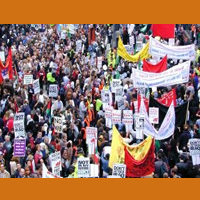SUMMARY OF OUR MONEY
SUMMARY OF OUR MONEY IN 13 PROPOSITIONS
The main points and arguments of in Our Money are summarized in the following 13 propositions:
1) Our current monetary system blocks both the tackling of the social and environmental problems society faces and a way out of the crisis
The technological knowledge, labour and productive capacity to address society’s problems exist or can be developed soon. The fact that our resources are not used to do so is a direct result of the current monetary system, which leads to money being created and used for other ends. Thus our monetary system blocks tackling the main problems society faces as well as a way out of the crisis.
2) Money need not be scarce
Money is a medium of exchange, unit of account and means of saving. It is something artificial on which we have agreed as representing a certain value. Because most money is electronic, meaning it does not physically exist but only occurs in the memory banks of computers, it can, in principle, be created at will.
3) Lack of money as an obstacle to tackling society’s problems
We are told that the major problem in addressing society’s environmental, social and economic problems is lack of money. That is irrational: since money can, in principle, be made at will the lack of it should never be an obstacle to addressing society’s challenges.
4) Money creation: the privilege of private banks
Almost all of our money is created by private banks. It is created out of thin air by an accounting practice engaged in when a bank makes a loan. The privilege of being able to create money in this manner endows banks with profits that should benefit society as a whole.
5) The current system leads to instability and indebtedness
The current system of money creation leads to instability and crisis. Private banks create too much money when things go well and too little when the economy is doing poorly needs it. Private money creation is inextricably linked to interest, leading to mounting debts which may become impossible to repay after a slump.
6) No money for solving society’s problems and investments in sustainable development
Money is created only for what banks and their customers find important, not for the public good. For the latter the government must raise money, through taxes or borrowing. As a result of existing government obligations and debt, worsened by bailing out banks during the financial crisis, there is too little money for investment for the public interest.
7) Disadvantages of money creation by private banks: from crisis to crisis
Irresponsible lending by private banks caused the financial crisis of 2008. Since then central banks have tried to address the economic crisis by encouraging banks to lend more to the “real” economy of goods and services. In practice much of this money is used for speculation, of which private banks and other financial players expect higher returns. Thus private banks, supported by central banks, are laying the basis for the next crisis.
8) The alternative: public money creation
Governments have little control over money creation and distribution. This lack of control over a key resource is a democratic deficit at the expense of the public interest. Money creation is a public service which should be under the control of the state. Public money creation by an independent monetary authority is a logical and attractive alternative to money creation by private banks. Such a system would allow bringing new money into the economy without creating debt.
9) Benefits of public money creation
Public money creation would reduce both public and private debt. It would curb economic ups and downs, speculation and thus the risk of financial crisis. It would give more options to fight inflation and deflation. And it would give the state much ampler resources for investment, without requiring higher taxes or debt.
10) Public money creation can remedy the addiction to growth
Public money creation would eliminate the need for economic growth, a requisite arising from the fact that with private money creation debts have to be repaid with interest. With government creating debt-free money this imperative disappears, opening the way for an economy and society using finite resources in a sustainable manner.
11) Money creation for solving society’s problems: a political choice
Public money creation would give government greater leeway for investment in the public interest. However, politicians and voters must opt for such spending: the benefits of public money creation can also be used for (more) unsustainable consumption and thereby the faster exhaustion of finite resources.
12) Faith in markets impedes the search for alternatives
A major obstacle to monetary reform is mainstream economic science. The belief that market forces will ensure that banks create the right amount of money for an optimally functioning economy leads to the current monetary system not even being questioned. So strong is this belief in markets that even the enormous problems caused by the crisis of 2008 have given economists no cause to look for alternatives.
13) The need to open the debate on an alternative financial system
A debate about the current monetary system and the alternative, public money creation, is urgently needed. Political parties but also civil society organizations such as trade unions, environmental groups and other voluntary, non-profit and interest groups should pressure their political representatives to open this debate.



